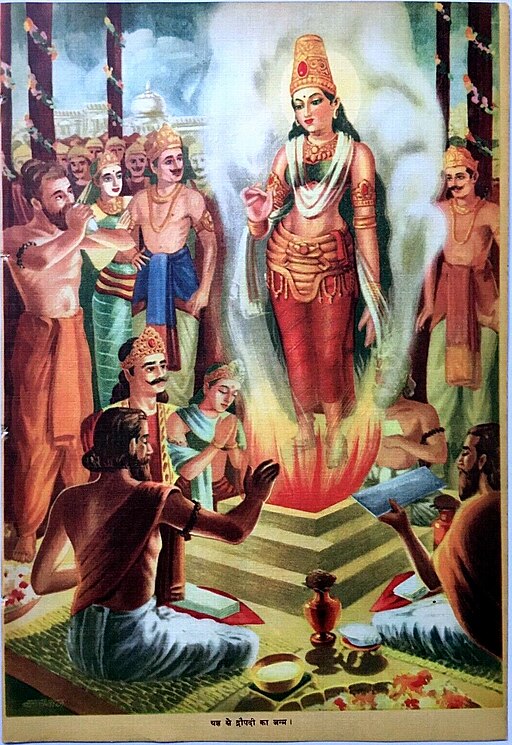Draupadi In The Mahabharata

Draupadi’s birth from the sacred fire.
Introduction
This page will give you answers to everything you have ever wanted to know about Draupadi in the Mahabharata. Here, you’ll learn about the purpose of her birth, the meaning of her name and the various names ascribed to her. You’ll find dozens of stories from the Mahabharata that illustrate the strength of her character as she endured unimaginable suffering and a roller-coaster of a life to bring relief to Mother Earth and her denizens.
Among all the characters of the Mahabharata, Draupadi is the most debated, revered, and misunderstood person. Everything about her was extraordinary. Born as a fully grown woman from the ceremonial fire to the King of Panchala, she went on to marry five men, was staked in a gambling match, dragged and humiliated after the gambling match, and went into exile for thirteen years with her husbands as a consequence of that gambling match. During the exile, she travelled over some of the most difficult and dangerous terrains. In this period, she was kidnapped twice, lusted after by a powerful warrior, and was tied and taken to be burnt on the funeral pyre while she was still alive. In this period, Draupadi, who was herself a queen, worked as the Queen of Virata’s hair-dresser.
During the exile, she constantly reminded her husbands to fight Duryodhana to regain their lost kingdom. Eventually, the war did happen, where she witnessed the death of her loved ones, countless warriors, and the vast destruction of an entire race.
She arose from all these calamities like a phoenix rising from the fire to help her husbands revive the kingdom of Hastinapur and reinstate dharma and peace on earth.
It is no surprise that a woman like her will always be debated, revered, and misunderstood. However, those who engage in Draupadi’s character analysis through the limitations inherent in the human mind will never be able to understand her.
To truly understand Draupadi’s character and the events in the Mahabharata, we have to take a step back and push the pause button on our constantly judging minds. Then we need to learn about her celestial origin and understand her mission on Earth because, ultimately, it’s this mission around which Draupadi’s actions and the entire Mahabharata revolve.
Commonly asked questions about Draupadi are answered in the Mahabharata FAQ while a deeper analysis of her life can be found in the essays of the Mahabharata and the dharma in the Mahabharata.
Note: This page uses Sanskrit words like devas, asuras, and others. We made this choice because translating them would distort either the meaning or the feeling of the word. All these words have been explained in the Glossary.
Draupadi’s Names
Draupadi is hailed by several names in the Mahabharata. The most widely used names are Draupadi, Krishna, Panchali, and Yajnaseni. Other names that are also attributed to her are: Drupadakanya, Sairinshri, Parshati, Nityayuvani, Mahabharata, Agnisuta, Kalyani, Malini, Yojanagandha, Panchavallabha, and Pandusharmila.
Many people ask, “Is Draupadi Hindi?” Well, Hindi is a very recent language. Back in the time of the Mahabharata, Sanskrit was the language of choice. However, Draupadi in Hindi and in Sanskrit mean the same thing: “The daughter of King Drupada.”
Multiple names for characters is quite common in the Mahabharata. Sri Krishna, Veda Vyasa, Yushishthira, Bhima, Arjuna, Karna, Duryodhana, and many other people had more than one name.
Draupadi’s Suffering
Staked and Dragged in the Game of Dice
Draupadi’s story contains many events of personal suffering, but this event was where it all started.
Duryodhana once planned a deceitful game of dice to take the Pandavas’ kingdom from them. The unthinkable happened in this game of dice. After losing his wealth, army, kingdom, brothers, and even himself, Yudhishthira put his wife Draupadi as the stake and lost her too.
Imagine the horror she would have felt upon learning that her husband had staked and lost her in a game of dice. And as if this wasn’t enough, her brother-in-law, Dussadana, stormed into her chamber, grabbed her hair, dragged her to the assembly hall where the game of dice was being played and tried to disrobe her in front of all the assembled elders and kings. When this shameful act took place, Draupadi — the queen of Indraprastha — was in her period with only a single piece of cloth covering her body.
When she looked at her husbands, who had all been lost and enslaved to Duryodhana, she saw them sitting with their heads down in shame. None of them were able to meet her eyes. Next, she appealed to all the elders and nobles of the Kuru Court for help and justice, but none was served.
Eventually, the Pandavas were set free by Draupadi when King Dritarasthra sought to pacify her and told her to ask for whatever she wanted.
Exiled From Her Kingdom
Having regained their freedom after the game of dice, Draupadi and the Pandavas returned to their kingdom. However, very soon, another deceitful game of dice was played. Yudhishthira lost again. This time, they were exiled from their kingdom for thirteen years. Draupadi could have spent those years in her father’s palace, but she chose to accompany the Pandavas in that difficult and dangerous exile.

Abducted By Jatasura
There was a time in the Pandavas’ exile when they stayed at the Nara Narayana Hermitage. A rakshasa called Jatasura disguised himself as a brahmana and befriended them in this ashram. Jatasura, had two objectives. He wanted to take the Pandavas’ weapons and fulfil his lustful intentions towards Draupadi. Consequently, one day he took off with Yudhishthira, Nakula, Sahadeva, Draupadi, and the Pandavas’ weapons. Fortunately, Draupadi and the Pandavas were saved from the rakshasa.
Abducted By Jayadratha
This incident also happened when Drauapdi and the Pandavas were in exile. They were at a hermitage in Kamyaka forest Jayadratha, the king of Sindh, was passing through that forest when he saw a maiden whose beauty was beyond comparison. The foolish Jayadratha kidnapped her even after being told that she was Draupadi, the wife of the five Pandavas.
When the Pandavas found out what had happened, they pursued Jayadratha and his companions, defeated them, and rescued their beloved wife.
Served as the Queen Sudeshna’s Hair-Dresser During the AgyataVaasa
In their thirteen years of exile, Draupadi and the Pandavas had to spend one year in hiding. They spend this year in the Matsya kingdom where Draupadi — the Queen of Indraprastha — disguised herself as a sairandhri and took up employment as the Queen of Virata’s hairdresser. Draupadi did this work cheerfully without ever complaining that she had to work as a maid even though she was herself a queen.
Lusted For And Assaulted by Keechaka — The Commander-In-Chief of the Matsya Army
When Draupadi served as a Sairandhri for Queen Sudeshna, the queen’s brother (Keechaka) happened to see Draupadi once and was instantly filled with lust for her. Keechaka groped her, assaulted her, and seized Draupadi by her hair to throw her on the floor in King Virata’s assembly. As if this wasn’t enough, Draupadi also had to suffer Keechaka’s kicks. Such was the power that Keechaka wielded that no one in the royal court, not even the king, dared to say a word against him. Ironically, once again, Yudhishthira (disguised as Kanka) was playing dice with King Virata when this incident happened.
Suffered The Pain Of Losing Loved Ones In The Kurukshetra War
While it’s true that Draupadi wanted the Kurukshetra war and incited the Pandavas several times to fight, it is also true that she experienced the pain of losing her five children, the children of her husbands from other wives, her brothers, her nephew, and her father in the war. However, she arose from the rubble from the pain and destruction to help rebuild the kingdom of Hastinapur and make it a place where goodness thrived once again.
Note: This page uses Sanskrit words like devas, asuras, and others. We made this choice because translating them would distort either the meaning or the feeling of the word. All these words have been explained in the Glossary. Please follow the link to learn more about their usage.
